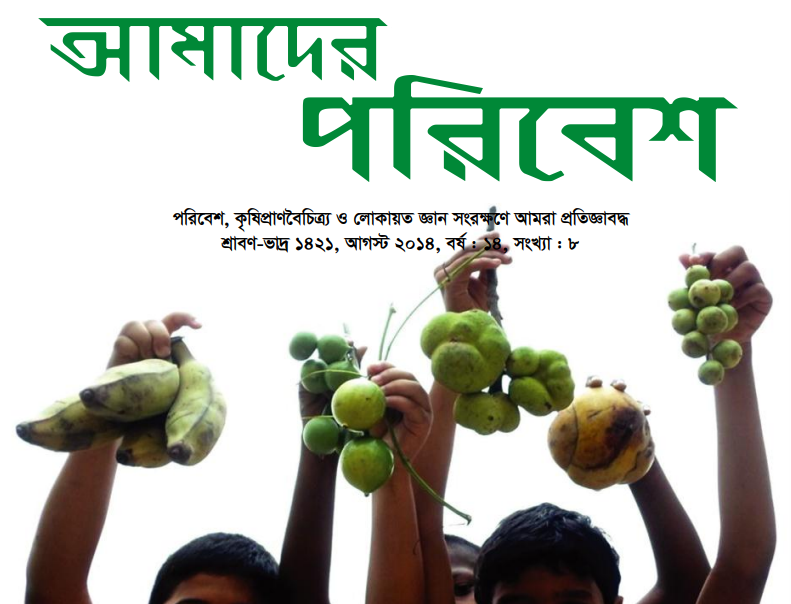Sumon, Ahidur Rahman and Shankar Mrong from Netrokona
The current total population of the world is 653 crore (as of 2017). Of these, India and China alone have a population of over 260 million (according to the data of 2020, the total population of India is about 136 million and according to the data of 2019, the total population of China is 140 million). The size of Bangladesh is very small compared to India and China. However, although 25% of the total land area of populous Bangladesh is supposed to be forested, the amount of forest in Bangladesh is very low at present. According to ‘The State of Golabal Forest’-2018, only 13 percent of the total land area in the country is forested. According to the Ministry of Forests and Environment, Bangladesh has only 18 percent of forest area (forest and tree covered area). According to experts, the people of the country plant very few trees every year and the forest is not developing as required. However, if one tree is cut down, at least two trees need to be planted.
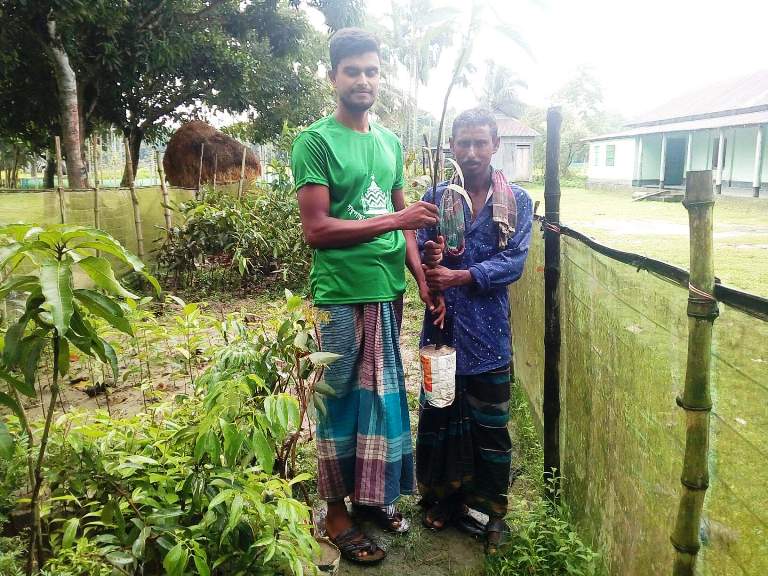
BARCIK, a development organization has been working for the conservation and development of agro-environment, ecology and biodiversity in the Netrokona region since 2001. The oorganization has been conducting campaign to encourage people conservating agricultural biodiversity in the Netrokona region since its strating to work in that area. This resulted in the increase eagerness and interest of students, public organizations and educational institutions to plant trees.
Although the interest of the people in planting trees has increased day by day, the scarcity of tree seedlings has become an obstacle in afforestation. Most of the time seedlings of required and correct height are not available, and there is no nursery in the area. People have to go to distance area for buying seedlings which cost them more cash. Since there is lack of place and high lands that is why it is difficult for the haor people to make a nusery in their sorrounding areas. Thus, the buy tree seedling from the nurseries which are far from their residence and increases their transportation cost.
Considering these facts, BARCIK takes initiative to set up a total of four nurseries in the plains and haor areas since 2016 on the basis of individual interest with the aim of making diverse tree saplings easily available to the people. These nurseries are located in Sadhupara village of Biska union in Tarakanda upazila of Mymensingh district, Maujebali village of Kailati union in Netrokona Sadar upazila and two others in Uchitpur and Kuliati villages of Haor Ghesha in Madan union of Madan upazila of Netrakona district. In two nurseries in Haor area, farmers produce a variety of fruit, forest, medicinal, flower, vegetable and water tolerant tree seedlings and in a flat nursery, only fruit, forest, medicinal, flower and vegetable seedlings have been produced.
Current condition of the nursery
Presently there exist more than 20/22 thousand saplings of 18 varieties of trees in two haor nurseries in Madan upazila. Of these, about ten thousand seedlings are water tolerant Hijal and Karach. The setting of nurseries in the haro areas have enbled the local people and farmers to collect different varieties of seedling from those nursery and plant in their sorrounding and in their respective houses. Thus, farmers in Haor area can now go to the nursery at any time to collect the seedlings of their choice. Now that the saplings are within their reach, they no longer have to spend more money on transporting the saplings. Anyone, male or female, can collect saplings from the nursery at any time. The currently available seedlings in these two nurseries include: papaya, guava, blackberry, jackfruit, betel nut, lemon, bell, watermelon, and olive, black pepper, kanchanful, chlorophyll, neem, roar, mahogany, hijal and karch. In addition, seasonal vegetable seedlings such as chilli, chukai, tomato, eggplant, gourd, bean, pumpkin, sweet pumpkin etc.
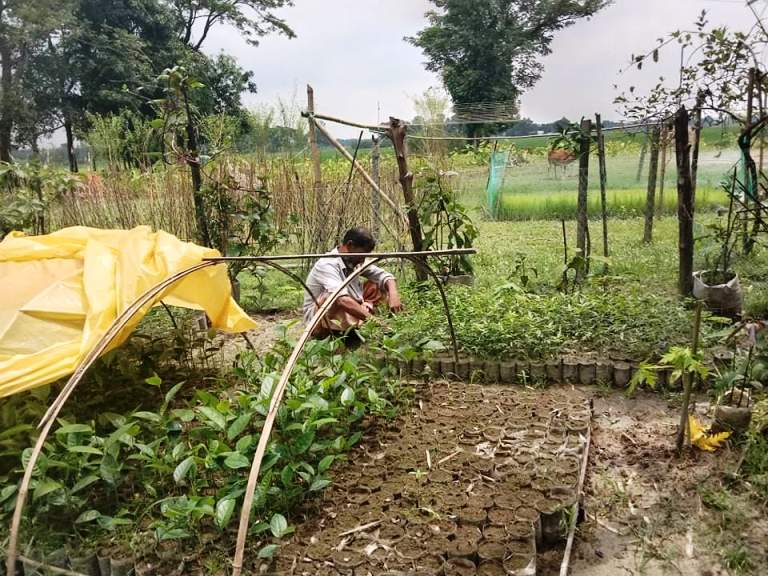
Seeing this, Arab Ali Talukder of Uchitpur village of Madan Upazila has taken initiative to set up a haor nursery called ‘Talukdar Nursery’ in collaboration with BARCIK at the end of 2019. So far, mango, jackfruit, watermelon, guava, amra, olive, hijal, karach, neem, chilli, eggplant, papaya, gourd, Kanchan flowers, banyan seedlings are available in his nursery. Due to the lack of high ground for seedling production and the small size of the house, farmer Arab Ali made beds with bamboo in a two-storied mancha method and produced pepper, eggplant and papaya seedlings. At present, the seedlings of Hijal and Karach are about 4/5 feet tall. Arab Ali hopes to be able to sell the seedlings produced in the nursery for lakhs taka in near future. He said that many organizations have already expressed their demand for seedlings after receiving news of production of water tolerant trees in his nursery. The Netrokona Water Development Board has already purchased 3,000 Hijal Karach saplings from his nursery for afforestation in the Haor crop protection dam. Dirai, Salla and Khaliajuri upazila wholesalers have expressed interest to buy seedlings from him as well. Thus, it has been seen that setting nursery does not only ensure seedling for tree plantation but also earns the owner cash which helps them to improve their livelihood.
On the other hand, Jasmin Akhter, a farmer from Kuliati village, has been producing a variety of fruit, forest, medicinal and flower saplings since 2019 by setting up a nursery called ‘Dana Nursery’ on 3 decimal of her lands with the supports from BARCIK. The nursery has about 8300 trees including 20 varieties of mango, jackfruit, betel nut, papaya, guava, olive, watermelon, black pepper, kanchan, hijal, mahogany, roar, karach, neem, chlorophyll, bohera, chilli, eggplant, pumpkin and sweet pumpkin. So far, she has sold saplings worth over BDT 1.5 lakh and distributed about 1,200 saplings (papaya, betel nut, guava and vegetable saplings) among the villagers free of cost.
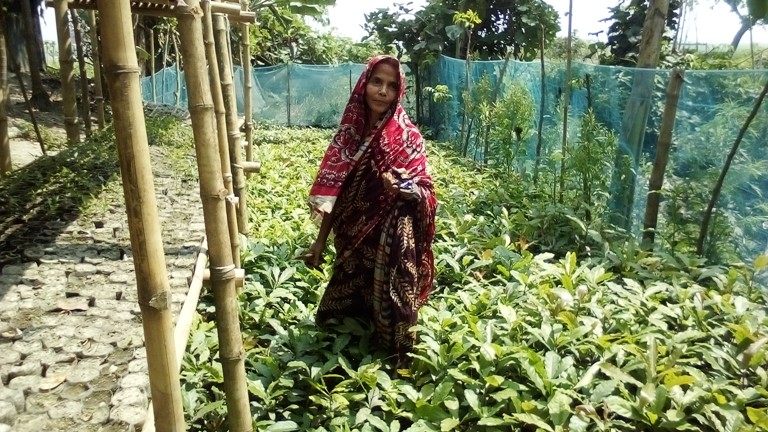
In addition. Abul Kalam a farmer from Maujebali village in Netrokona Sadar Upazila, has set up nursery with material and technical supports from BARCIK. He has produced 13 varieties of mango, jackfruit, papaya, guava, lemon, watermelon, neem, black currant, kanchanful, brinjal, chilli, gourd and sweet pumpkin in the last one year in that nursery. In the last one year, he has sold 2,000 saplings of that earns him cash which he used to meet educational expenses of his three daughters (college and high school). At present Abul Kalam Nursery has about 3000 saplings of 6 varieties (Mango, Jackfruit, Blackberry, Mahogany, Neem, Lemon and Krishnachura). However, he has taken the initiative to produce a variety of winter vegetable seedlings for sale. He said he would produce a variety of fruit saplings in the future if he gets cooperation.
Meanwhile Abdul Qayyum, 18, a school going student from Sadhupara village in Tarakanda upazila of Mymensingh district, used to produce saplings for himself by collecting seeds of various fruits as a hobby. Once he visited the nursery of Ali Ahmed at the village adjacent to Kashiganj Bazar of the upazila and learned the technique of seedling production from seeds and grafting. Later, he started producing seedlings on a small plot of land. In 2017, he practically learned the technique of grafting /Kalom/cutting from the experienced farmers with support of BARCIK. This learning enabled him making improved seedlings. In 2020, with support from BARCIK, Abdul Qayyum along with two other farmers from Netrokona area participated in a three-day practical training on nursery management at ‘Sumi Nursery’ in Madhupur Upazila, Tangail District. Qayyum also learned about modern methods of seedling production from seeds and grafting by watching various agricultural programs on YouTube and television. He applied his trained knowledge and experience to his own nursery to produce grafting seedlings of various fruits. Among the grafted seedlings in his nursery include: mango, jackfruit, blackberry, guava, litchi, lemon, white, grape fruit. By September 2021, he produced 7,000 saplings of 20 varieties (from seeds and cuttings) and sold them as well as distributed to the villagers for free. Qayyum also provided 51 Jam and Neem (Nim-2) saplings from his nursery to Sadhupara Krishak Sangathan and Sonar Bangla Youth Organization to develop Sadhupara village to plant these in the roadside! In the future, Qayyum will set up large scale nurseries to produce more than a hundred species of saplings of local and foreign trees, making it easily available to the people, so that the community could plant a variety of timber, fruit and medicinal plants in the area.
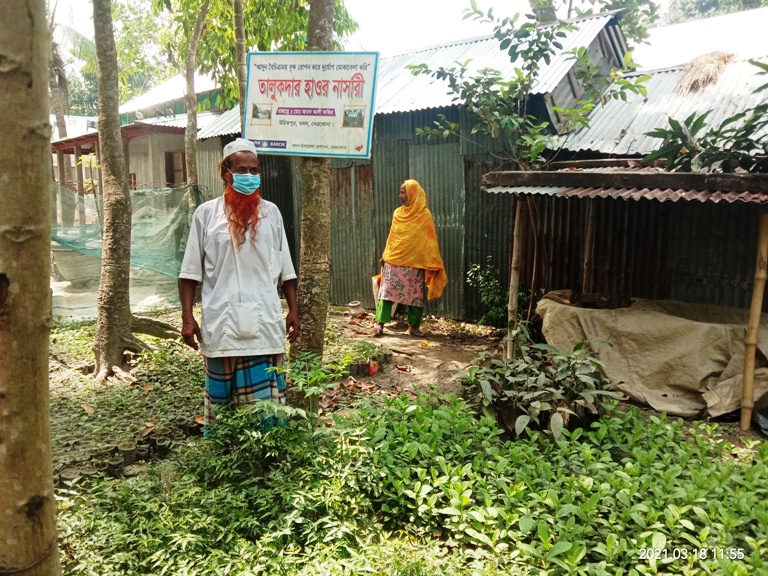
By setting up nurseries in Haora area, the four farming families are able to plant a variety of tree saplings and a variety of vegetable saplings themselves. They produced tree saplings and vegetable saplings to be financially profitable as well as supply seedlings to the people of the area. As a result of this number of trees and vegetable has increased in the area. The nursery has created employment for four elderly men and women as well. Besides, the seedlings crisis for the afforestation of water tolerant trees in Haor area will be alleviated soon. However, in order to increase the biodiversity of the area, BARCIK and local organizations have taken initiative to motivate the concerned families to plant various fruit and medicinal plants in their respective houses and fallow lands. Abdul Qayyum Talakder, general secretary of the organization, said, ‘In the past, we have bought water-tolerant hijal and karch saplings from the surrounding upazilas at a high price for afforestation.” He asserts, ‘We have spent a lot on transporting saplings as well. But now that there is a nursery in the village, there will be no cost for transporting the saplings and I will be able to select the saplings and plant them in the dam. We will be able to develop the environment of the haor by planting more trees in the area.’
Translated by Silvanus Lamin

